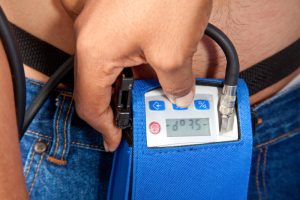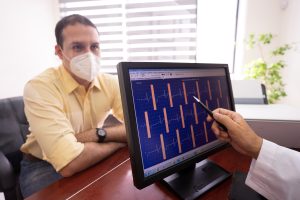So, you've just heard that your doctor wants you to wear a cardiac holter?
Don't worry, it's just a little machine that will record your heartbeat for 24 hours, or maybe even longer.
It's like having a roommate who follows you around, except he doesn't make noise or take up space on the couch. 😂
Now you're probably wondering how you're going to cope with this new accessory?
Don't panic, we're here to help! ☝️
In this comprehensive guide to wearing a cardiac holter, we'll explain everything you need to know about this little box.
So take a deep breath, relax and let us guide you through this thrilling experience. ☕
What is a cardiac holter?
A cardiac holter is a small, portable device that continuously records your heart's electrical activity over a set period of time, usually 24 to 48 hours.
It is a non-invasive diagnostic tool used to assess heart rhythm disorders and other cardiac problems that may not be detected during a regular physical examination or routine electrocardiogram (ECG).
The cardiac holter is a small box that attaches to your belt or fits in a pocket, and is connected to electrodes placed on your chest using a cable. 👖
During the monitoring period, the device records all the electrical activity of your heart, including irregular beats, arrhythmias and heart pauses.
The recorded data is then analyzed by a specialized doctor to assess the state of your heart health and identify any problems. 📈
The cardiac holter test is usually recommended by doctors for patients who have cardiac symptoms such as palpitationsdizziness, weakness or chest pain.
The test may also be recommended for patients who have already been diagnosed with a heart rhythm disorder or who are at high risk of developing heart disease. 🫀
What is a cardiac holter used for?
The device is used to detect and record any anomalies or problems in a patient's cardiac rhythm.
It is commonly used to diagnose cardiac rhythm disorders such as atrial fibrillation, ventricular tachycardia, bradycardia, extrasystoles and heart blocks.
In addition, it can be used to detect changes in heart rate during normal daily activities or during specific physical activity. 🏃
In addition to detecting heart rhythm disorders, a cardiac holter can also help monitor the effectiveness of treatment for a heart condition.
In short, the cardiac holter is a valuable tool for diagnosing and monitoring heart problems, enabling doctors to provide effective, personalized treatment for their patients.
How can a cardiac holter help doctors diagnose heart problems?
Recording the heart's electrical activity over a long period enables doctors to detect rare or intermittent cardiac events that may go undetected during a short diagnostic test. ⏱️
The data collected by the cardiac holter can also help doctors determine the underlying cause of a patient's cardiac symptoms, such as palpitations, dizziness or chest pain.
Cardiac holter test results can also help doctors monitor the effectiveness of treatments for heart problems.
By monitoring the heart's electrical activity over an extended period, doctors can determine whether drug treatments or interventions have improved or stabilized a patient's heart rhythm.
In short, the cardiac holter is a valuable tool to help doctors diagnose heart problems by continuously recording the heart's electrical activity over an extended period. 🧑⚕️
In this way, the test results can help doctors provide effective, personalized treatment for their patients' heart conditions.
Are there any side effects associated with wearing a cardiac holter?
There are few side effects associated with wearing a cardiac holter.
The test is generally considered safe and non-invasive. 👌
However, some patients may experience slight irritation or redness at the electrode sites where the skin has been attached.
This is often temporary and disappears quickly after the electrodes are removed.
In rare cases, a patient may develop an allergic reaction to one of the materials used for the electrodes or the fixing strip.
If you experience any itching, redness or rash, you should inform your doctor immediately. 🧑⚕️
Wearing the device can also cause discomfort or a feeling of weight on the body, especially if you have to wear the device for an extended period of time.
Some patients may also find it difficult to sleep or move around normally with the device, although this depends on how the device is attached to the body.
Overall, the side effects associated with wearing a cardiac holter are generally minor and temporary.
If you have any concerns or questions about the side effects of the test, it is important to discuss them with your doctor.
 What are the instructions for wearing a cardiac holter?
What are the instructions for wearing a cardiac holter?
There are several instructions to follow when wearing a cardiac holter to ensure that the device correctly records your heart's electrical activity:
❤️ Avoid getting the electrodes wet: The electrodes must remain dry while you are wearing the device. Avoid showering, bathing or swimming during the monitoring period.
❤️ Avoid electromagnetic fields: Avoid staying close to any object that generates a strong electromagnetic field.
❤️ Avoid wearing tight clothing: Avoid wearing tight clothing around the electrodes, as this can affect recording quality.
❤️ Do not remove electrodes: Electrodes must remain in place throughout the monitoring period. If an electrode becomes detached or loose, contact your doctor immediately.
❤️ Keep an activity diary: It's important to record all your activities, such as meals, exercise, sleep and any heart symptoms you may be experiencing. This will help your doctor interpret the test results.
❤️ Follow your doctor's instructions: Your doctor will give you specific instructions on how to wear the device and what precautions to take during the monitoring period. It is important to follow these instructions carefully to ensure accurate results.
By following these instructions, you can ensure that your heart holter correctly records your heart's electrical activity, enabling your doctor to accurately diagnose heart problems and provide effective treatment.
What are the steps to follow once the cardiac holter has been discontinued?
After the end of the monitoring period with a cardiac holter, there are several steps to follow:
❤️ Waiting for the results: Your doctor will review the test results and provide you with the results and information on the next steps. If the results show an abnormality or a heart problem, your doctor may recommend further tests or treatment.
❤️ Keep a symptom diary: It's important to keep a record of any heart symptoms you experience after the test. This will help your doctor to monitor your heart health and to determine whether additional measures need to be taken.
❤️ Follow your doctor's instructions: If your doctor recommends any treatment or lifestyle changes, it is important that you follow them. important to follow these instructions carefully to improve your health heart.
In short, after the end of the monitoring period with a cardiac holter, it's important to continue following your doctor's instructions to monitor your heart health and take the necessary steps to keep your heart healthy.
Make an appointment now at one of our clinics: Laval, Mascouche and Vaudreuil-Dorion - it's time for a lung check! 😀




